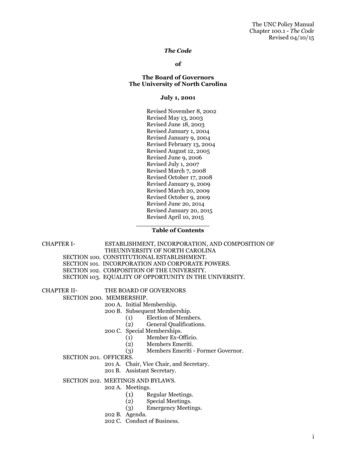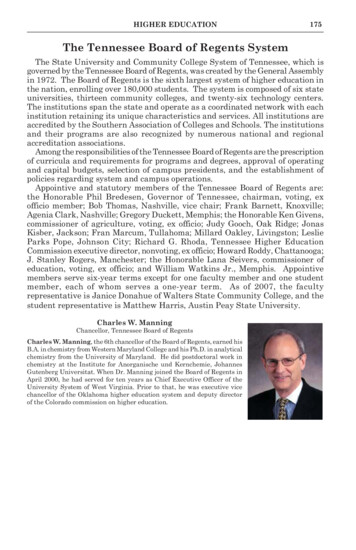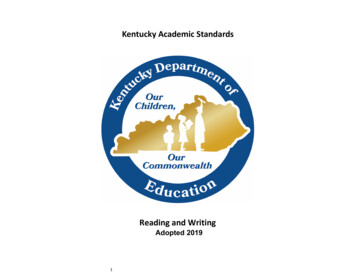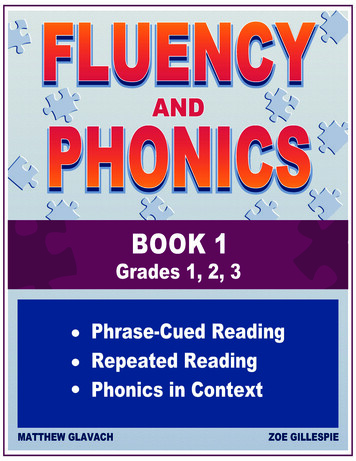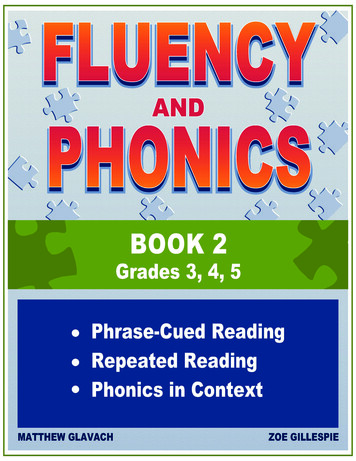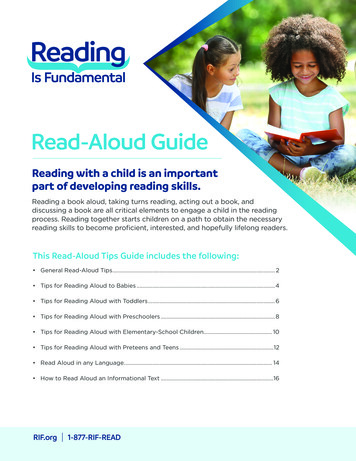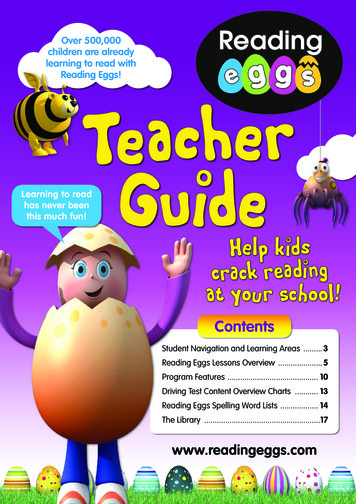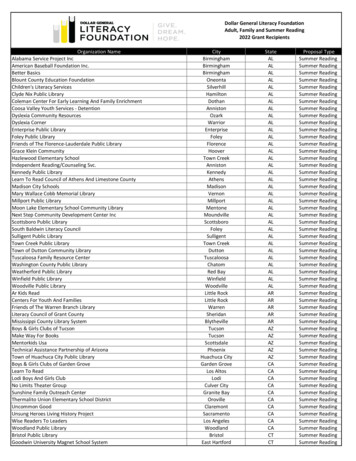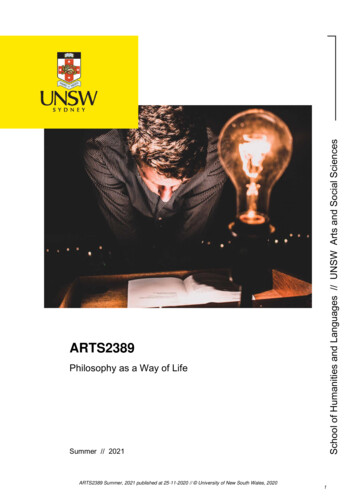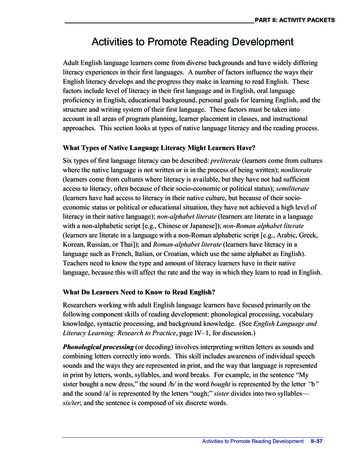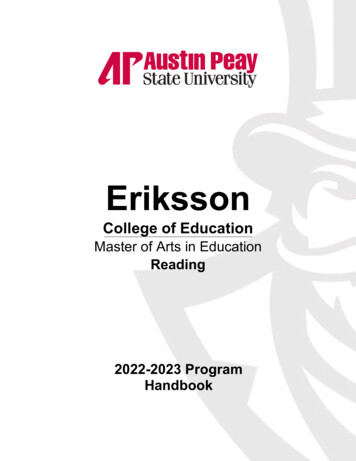
Transcription
ErikssonCollege of EducationMaster of Arts in EducationReading2022-2023 ProgramHandbook
Table of ContentsIntroduction . 4Austin Peay State University Accreditation . 4Eriksson College of Education Accreditation . 4Mission Statements . 5University Mission . 5Department Mission . 5Program Mission . 5Policies . 6Student Rights . 6University Policies . 6Graduate Bulletin . 6Student Handbook . 7Nondiscrimination Policy . 7Support Resources . 8Academic Support . 8Student Support Services . 8Scholarships . 9Financial Aid . 9Program Requirements & Curriculum . 10Program Description . 10Matriculation . 10Non-Coursework Requirements . 11Changes to Program . 11Change of Major/Concentration . 12Licensure . 12Advising . 12Performance Standards for Reading Master's Degree (ILA-2017) . 13Curriculum Map . 15Course Standards Map . 15Course Descriptions . 202
Key Contacts . 23Accreditation . 24Austin Peay State University Accreditation . 24Eriksson College of Education Accreditation . 24Reporting Information . 24Appendix . 27Appendix A: Calendar of Course Offerings . 27Appendix B: Sample Schedule . 283
IntroductionThe Eriksson College of Education at Austin Peay State University providesacademic programs that prepare candidates to teach PreK through high school aswell as advanced graduate degree programs. The Department of EducationalSpecialties, housed in the Eriksson College of Education, offers a variety of degreeprograms, primarily at the graduate level. As you seek a Master's degree in Reading,you will have the opportunity to engage in classes with peers who are pursuing thesame degree and with instructors who have had extensive teaching and scholarlyexperience in the area of reading/literacy.Austin Peay State University AccreditationAustin Peay State University is accredited by the Southern Association of Collegesand Schools Commission on Colleges to award associate, baccalaureate, master's,education specialist, and doctorate degrees. Questions about the accreditation ofAustin Peay State University may be directed in writing to the Southern Associationof Colleges and Schools Commission on Colleges at 1866 Southern Lane,Decatur, GA 30033-4097, by calling (404) 679-4500, or by using informationavailable on SACSCOC's website (www.sacscoc.org).Eriksson College of Education AccreditationThe Eriksson College of Education at Austin Peay State University has beenaccredited by the National Council for Accreditation of Teacher Education (NCATE)for over sixty years. Our last accreditation was in 2021; the next accreditation visit,now conducted by the Council for the Accreditation of Educator Preparation (CAEP),4
will take place in 2028.Mission StatementsUniversity MissionAustin Peay State University is a mission-driven, community-minded institution thatprovides transformational experiences through innovative, creative, and scholarlyactivities. We welcome and inspire an inclusive community of learners to make apositive impact regionally and globally.Department MissionThe mission of the Department of Educational Specialties is to prepare and supporteducational professionals in their development as effective practitioners.Program MissionThe mission of the Reading master’s program is to develop literacy professionals whoare prepared to work with students and teachers to provide literacy support andservices.5
PoliciesStudent RightsAnyone enrolling at Austin Peay State University is entitled to all rights granted tohim/her by the Constitution of the United States and is entitled to the full protectionof the law. Apart from those rights and duties enjoyed by nonstudents, enrollmentin the University carries with it special privileges and imposes specialresponsibilities. The University has established regulations and certain due processprocedures essential to an atmosphere of mutual respect which is sensitive to therights of all individuals. A list of student rights can be found s.php. If you have questions,please contact the Office of Student Affairs at 931-221-7341.University PoliciesAPSU policies enhance the University's mission, promote operational efficiencies,reduce institutional risk, and provide an understanding of the University'sexpectations for operation. Access the numerical or alphabetical policy index byvisiting this link: https://www.apsu.edu/policy/. Policies addressing the APSU Codeof Conduct for students may be found by visiting this raduate BulletinMaterial presented in the graduate bulletin is for informational purposes only andshould not be construed as the basis of a contract between a student and AustinPeay State University. Bulletins may be accessed by visiting this link:6
t HandbookYou may access a digital or hard copy of the student handbook by visiting this link:https://www.apsu.edu/handbook/ The policies, procedures, and programs of APSU arecontinually reviewed. Every effort is expended to ensure the handbook representsaccurate information at the time of publication, but it cannot be guaranteed thatinformation contained herein will not change. The handbook does not constitute acontract between the University and the student. APSU may cancel or revoke any partof this handbook without notice. The University reserves the right to make changes asrequired or as needed to dates, programs, events, policies and regulations, and rules,as well as determine the effective date for such changes. Failure to read the handbookdoes not exempt students from following regulations, requirements, procedures, andpolicies described herein.Nondiscrimination Policy"APSU shall not engage in practices which would discriminate against anyindividual or group because of race, color, religion, ethnic or national origin, sex,sexual orientation, gender identity/expression, disability, age (as applicable), statusas a covered veteran, or genetic information. The University specifically finds thatdiversity of students, faculty, administrators, and staff is a crucial element of theeducational process and reaffirms its commitment to enhancing education throughaffirmative action to increase diversity at all levels." APSU Policy 6:003 EqualOpportunity, Affirmative Action and Nondiscrimination – March 25, 20177
Support ResourcesAcademic Support Peer Tutoring: Free group support for undergraduate courses for APSUstudents. Tutoring is available for most core courses and some upper-divisioncourses. To learn more or schedule sessions with a peer tutor, please visithttps://www.apsu.edu/lrc/tutoring/. Writing Center: Free individual assistance with any paper, for any class, in anywriting style, for APSU students. To learn more or schedule sessions with a writingtutor, please visit https://www.apsu.edu/writingcenter/ or stop by the Writing Center(located in the back of Woodward Library). Workshops: GMAT Prep., GRE Prep., TEAS Prep., PRAXIS Core Prep.,and more are available. To learn more, visit ntrance- exams.php. The Office of Disability Services (ODS) provides services for students withphysical, mental, or learning disabilities. For more information, please visithttps://www.apsu.edu/disabilitiy/ or call (931) 221-6230. The ODS is located inMorgan University Center Room 114.Student Support ServicesAPSU offers a variety of student support services, including access to the Felix G.Woodward Library and Boyd Health Services. Visit the following link to learn more:https://www.apsu.edu/govnow/student support services.php. APSU also offersmany services to its graduate students, including discounted childcare, access to theFoy Fitness Center, and free access to the Health Services and Counseling Servicesclinics. Visit the following link to learn more: student-services.php.8
ScholarshipsThe College of Graduate Studies offers Graduate Assistantships to current andprospective students. The Diversity Fellowship Grant and the Phi Kappa PhiFellowship are also available to current APSU graduate students. For moreinformation on these opportunities, please see below:Graduate AssistantshipsDiversity Fellowship GrantPhi Kappa Phi FellowshipHoppe Leadership Endowment250R Reduced Rate Tuition ProgramFinancial AidThe Reading program qualifies for the Teach grant. For more information about theTeach grant or to apply, please visit: mation.phpThe APSU Office of Office of Financial Aid can help guide you to financing youreducation or applying for student loans.Office of Financial Aid Ellington Building, Room 216Phone: (931) 221-7907, Toll-Free: (877) 508-0057sfao@apsu.edu9
Program Requirements & CurriculumProgram DescriptionThe Reading MAED program is designed for candidates interested in improving theirknowledge of literacy, best literacy practices, and/or pursuing a position as a readingspecialist, curriculum coach, or reading teacher. Listed below are the requiredcourses. Upon successful completion of the coursework, candidates will be awarded amaster’s degree. After three years of successful teaching experience and passing theReading Specialist Praxis exam, a Reading Specialist License may be awarded.MatriculationCriteria for Admission to the Program Undergraduate GPA of 3.0 Evidence of valid teaching licenseGraduate Admissions1. Complete an online Graduate Application at https://apsu.edu/grad-studies/applyadmission.php and pay the non-refundable 45.00 application fee. Once youstart the application process, you will need to create a personal pin number.Write this number down so you can use it later in case you are in the middle ofthe process and need to save the application to complete later. Be sure to listthe correct degree program: Education - Master of Arts - Reading.2. Official transcripts from all undergraduate universities are also required.These must be sent directly from the university to the Office of GraduateAdmissions to be valid. They may be sent digitally, as long as they are coming10
directly from the university. Transcripts are to be sent to the following address:Graduate AdmissionsAustin Peay State UniversityP.O. Box 4458Clarksville, TN 370443. Provide proof of immunizations. More information may be found yd-healthservices/Immunizations.phpNote: If you are unable to provide proof of immunizations, please email Dr. Hillat hillt@apsu.edu.4. Once a decision has been made concerning your admittance into theprogram, you will be notified. If you have any questions, email Dr. Hill athillt@apsu.edu.Non-Coursework RequirementsA basic subscription to LiveText by Watermark is required. LiveText by Watermarkis an e-portfolio that the Eriksson College of Education uses to monitor and track ourstudents' progress. Visit this website to purchase your subscription:https://www.livetext.com/. When you sign up, you will enter your A number(including the letter A) so your APSU courses will sync with your LiveText byWatermark account.Changes to ProgramChanges to programs are sometimes necessary. Minor changes such as curricular11
updates will be made on an as-needed basis. If a substantive change to the programis needed, the program lead must file necessary paperwork using the university'sCurriculog software, and various levels must sign off on the substantive change.Change of Major/ConcentrationIt is not uncommon for students to consider changing their major at some pointduring their academic careers. Course Choice Counts allows for change of major;however, timing is critical to avoid a negative impact on your financial aid. Visit thiswebsite to learn more: reThis program can lead to licensure as a Reading Specialist. In addition to completionof the program, three years of teaching and a passing score on the Reading SpecialistPraxis (exam 5302) are required for licensure in Tennessee. Upon meeting alllicensure requires, candidates must apply for the Reading Specialist license. Alllicensure questions should be directed to Mr. Kevin Fee, our Coordinator ofCertification and Licensure at (931) 221-6182 or feek@apsu.edu.AdvisingAfter declaring a Reading major, you will be assigned an advisor who isknowledgeable about the program. You will meet virtually with your advisor prior tothe beginning of each semester in order to determine your progress and the coursesto take in order to complete the program. Your advisor will be available to assist youthroughout your program.12
Performance Standards for Reading Masters Degree (ILA – 2017)Standard 1: Foundational KnowledgeCandidates demonstrate knowledge of the theoretical, historical, and evidence-basedfoundations of reading, writing, language, speaking, listening, viewing and the integralrole of the reading/literacy specialist in schools.Standard 2: Curriculum and InstructionCandidates use foundational knowledge to design literacy curricula to meet needs oflearners, especially those who experience difficulty with literacy design and implementsmall-group and individual evidence-based literacy instruction for learners with specificliteracy needs; collaborate with and coach school-based educators in developing,implementing, and evaluating instructional practices and curriculum.Standard 3: Assessment and EvaluationCandidates understand, select, and use valid, reliable, fair, and appropriateassessment tools to screen, diagnose, and measure student literacy achievement;inform instruction and evaluate interventions; participate in professional learningexperiences; explain assessment results and advocate for appropriate literacypractices to relevant stakeholders.Standard 4: Diversity and EquityCandidates demonstrate knowledge of research, relevant theories, pedagogies,essential concepts of diversity and equity; demonstrate and provide opportunities forunderstanding all forms of diversity as central to students’ identities; createclassrooms and schools that are inclusive and affirming; advocate for equity at school,district, and community levels.13
Standard 5: Learners and the Literacy EnvironmentCandidates meet the developmental needs of all learners and collaborate with schoolpersonnel to use a variety of digital and print materials to engage and motivate alllearners; integrate digital technologies in appropriate, safe, and effective ways; fostera positive climate that supports a literacy-rich learning environment.Standard 6: Professional Learning and LeadershipCandidates are self-aware, lifelong learners who collaboratively design, align, andassess instructional practices and interventions that support students and professionalcolleagues; develop, refine, and demonstrate leadership skills; engage in collaborativedecision making with and advocate on behalf of teachers, students, families, andcommunities.Standard 7: Practicum/Clinical ExperiencesCandidates complete a supervised, integrated, extended practicum/clinicalexperiences: one focused on intervention with students and other on novice coaching;practicum experiences are ongoing with at least one in school-based setting; andsupervision includes observation and ongoing feedback by qualifies supervisors.14
Curriculum MapProgram-Level SLOSLO 1 Demonstrate knowledge ofthe major theoretical, conceptual,and evidence-based foundations ofliteracy and language and the waysin which they interrelate.SLO 2 Identify, administer, andinterpret appropriate literacymeasures to assess students’literacy strengths and needs.SLO 3 Plan and implementinstructional design based onassessment data and best literacypractices.SLO 4 Demonstrate proficiencies inthe research process, includingconducting and presenting originalresearch on relevant issues inliteracy education.IntroducedRDG 5820ReinforcedEDUC 6630RDG 6051AssessedRDG 5840RDG 5860RDG 5820RDG 6051RDG 5840RDG 5830RDG 5860RDG 5820RDG 6051EDUC 6630RDG 5850RDG 5890RDG 5840RDG 5860RDG 5830RDG 5840RDG 5850EDUC 5000RDG 5860Course Standards MapStandard 1: Foundational KnowledgeCandidates demonstrate knowledge of major theoretical, conceptual, historical, andevidence-based foundations of literacy and language, the ways in which they interrelate,and the role of the reading/literacy specialist in schools.Indicators:1. Candidates demonstrate knowledge of the major theoretical, conceptual, historical,and evidence-based components of reading (e.g., concepts of print, phonologicalawareness, phonics, word recognition, fluency, vocabulary, comprehension)development throughout the grades and its relationship with other aspects of literacy.2. Candidates demonstrate knowledge of the major theoretical, conceptual, historical,and evidence-based aspects of writing development, writing processes (e.g., revising,audience), and foundational skills (e.g., spelling, sentence construction, wordprocessing) and their relationships with other aspects of literacy.3. Candidates demonstrate knowledge of theoretical, conceptual, historical, andevidence-based components of language (e.g., language acquisition, structure oflanguage, conventions of standard English, vocabulary acquisition and use,speaking, listening, viewing, visually representing) and its relationship with otheraspects of literacy.15
4. Candidates demonstrate knowledge of the historical and evidence-basedfoundations related to the role of the reading/literacy specialist.CourseRDG 5820RDG 5830RDG 5840RDG 5850RDG 5860RDG 5890RDG 5040RDG 6051EDUC 5000EDUC 6630NameFoundations of Reading and Literacy DevelopmentAssessing Literacy NeedsAssisting Students with Literacy NeedsSeminar on ReadingPracticum in Literacy DevelopmentTeaching Reading in the Secondary SchoolExpanding Literacy Across the Content AreasThe Art of Teaching WritingResearch in EducationReading and Writing Methods for ELL1.1X1.21.3X1.4XXXXStandard 2: Curriculum and InstructionCandidates use foundational knowledge to design literacy curricula to meet needs oflearners, especially those who experience difficulty with literacy; design, implement, andevaluate small-group and individual evidence-based literacy instruction for learners;collaborate with teachers to implement effective literacy practices.Indicators:1. Candidates use foundational knowledge to design, select, critique, adapt, andevaluate evidence-based literacy curricula that meet the needs of all learners.2. Candidates design, select, adapt, teach, and evaluate evidence-basedinstructional approaches, using both informational and narrative texts, to meetthe literacy needs of whole class and groups of students in the academicdisciplines and other subject areas, and when learning to read, write, listen,speak, view, or visually represent.3. Candidates select, adapt, teach, and evaluate evidence-based, supplemental,and intervention approaches and programs; such instruction is explicit, intense,and provides adequate scaffolding to meet the literacy needs of individual andsmall groups of students, especially those who experience difficulty with readingand writing.4. Candidates collaborate with and coach school-based educators in developing,implementing, and evaluating literacy instructional practices and curriculum.CourseRDG 5820RDG 5830RDG 5840RDG 5850RDG 5860RDG 5890RDG 5040RDG 6051NameFoundations of Reading and Literacy DevelopmentAssessing Literacy NeedsAssisting Students with Literacy NeedsSeminar on ReadingPracticum in Literacy DevelopmentTeaching Reading in the Secondary SchoolExpanding Literacy Across the Content AreasThe Art of Teaching Writing2.1XXXXX2.22.32.4XXXXXXX16
EDUC 5000EDUC 6630Research in EducationReading and Writing Methods for ELLXXStandard 3: Assessment and EvaluationCandidates understand, select, and use valid, reliable, fair, and appropriate assessmenttools to screen, diagnose, and measure student literacy achievement; inform instructionand evaluate interventions, assist teachers in their understanding and use ofassessment results; advocate for appropriate literacy practices to relevant stakeholders.Indicators:1. Candidates understand the purposes, attributes, formats, strengths/limitations(including validity, reliability, inherent language, dialect, cultural bias), andinfluences of various types of tools in a comprehensive literacy and languageassessment system and apply that knowledge to using assessment tools.2. Candidates collaborate with colleagues to administer, interpret, and use datafor decision making about student assessment, instruction, intervention, andevaluation for individual and groups of students.3. Candidates participate in and lead professional learning experiences to assistteachers in selecting, administering, analyzing, interpreting assessments, andusing results for instructional decision making in classrooms and schools.4. Candidates, using both written and oral communication, explain assessmentresults and advocate for appropriate literacy and language practices to a varietyof stakeholders, including students, administrators, teachers, other educators,and parents/guardians.CourseRDG 5820RDG 5830RDG 5840RDG 5850RDG 5860RDG 5890RDG 5040RDG 6051EDUC 5000EDUC 6630NameFoundations of Reading and Literacy DevelopmentAssessing Literacy NeedsAssisting Students with Literacy NeedsSeminar on ReadingPracticum in Literacy DevelopmentTeaching Reading in the Secondary SchoolExpanding Literacy Across the Content AreasThe Art of Teaching WritingResearch in EducationReading and Writing Methods for ELL3.13.23.33.4XXXXXXXXXXXStandard 4: Diversity and EquityCandidates demonstrate knowledge of research, relevant theories, pedagogies, andessential concepts of diversity and equity; demonstrate an understanding of themselvesand others as cultural beings; create classrooms and schools that are inclusive andaffirming; advocate for equity at school, district, and community levels.Indicators:1. Candidates demonstrate knowledge of foundational theories about diverselearners, equity, and culturally responsive instruction.17
2. Candidates demonstrate understanding of themselves and others as culturalbeings through their pedagogy and interactions with individuals both within andoutside of the school community.3. Candidates create and advocate for inclusive and affirming classroom andschool environments by designing instruction that is culturally responsive andacknowledges and values the diversity in their school and in society.4. Candidates advocate for equity at school, district, and community levels.CourseRDG 5820RDG 5830RDG 5840RDG 5850RDG 5860RDG 5890RDG 5040RDG 6051EDUC 5000EDUC 6630NameFoundations of Reading and Literacy DevelopmentAssessing Literacy NeedsAssisting Students with Literacy NeedsSeminar on ReadingPracticum in Literacy DevelopmentTeaching Reading in the Secondary SchoolExpanding Literacy Across the Content AreasThe Art of Teaching WritingResearch in EducationReading and Writing Methods for ELL4.1X4.24.34.4XXXXXXXStandard 5: Learners and the Literacy EnvironmentCandidates meet the developmental needs of all learners and collaborate with schoolpersonnel to use a variety of print and digital materials to engage and motivate alllearners; integrate technologies in appropriate, safe, and effective ways; foster apositive climate that supports a literacy-rich learning environment.Indicators:1. Candidates, in consultation with families and colleagues, meet thedevelopmental needs of all learners (e.g., English learners, those with difficultieslearning to read, the gifted), taking into consideration physical, social, emotional,cultural, and intellectual factors.2. Candidates collaborate with school personnel and provide opportunities forstudent choice and engagement with a variety of print and digital materials toengage and motivate all learners.3. Candidates integrate digital technologies into their literacy instruction inappropriate, safe, and effective ways and assist colleagues in these efforts.4. Candidates facilitate efforts to foster a positive climate that supports thephysical and social literacy-rich learning environment, including knowledge ofroutines, grouping structures, and social interactions.CourseRDG 5820RDG 5830RDG 5840RDG 5850RDG 5860NameFoundations of Reading and Literacy DevelopmentAssessing Literacy NeedsAssisting Students with Literacy NeedsSeminar on ReadingPracticum in Literacy Development5.1X5.25.3XX5.4XX18
RDG 5890RDG 5040RDG 6051EDUC 5000EDUC 6630Teaching Reading in the Secondary SchoolExpanding Literacy Across the Content AreasThe Art of Teaching WritingResearch in EducationReading and Writing Methods for ELLXXStandard 6: Professional Learning and LeadershipCandidates demonstrate the ability to be reflective literacy professionals, who applytheir knowledge of adult learning to work collaboratively with colleagues; demonstratetheir leadership and facilitation skills; advocate on behalf of teachers, students, families,and communities.Indicators:1. Candidates demonstrate the ability to reflect on their professional practices,belong to professional organizations, and are critical consumers of research,policy, and practice.2. Candidates use their knowledge of adult learning to engage in collaborativedecision making with colleagues to design, align, and assess instructionalpractices and interventions within and across classrooms.3. Candidates develop, refine, and demonstrate leadership and facilitation skillswhen working with individuals and groups.4. Candidates consult with and advocate on behalf of teachers, students,families, and communities for effective literacy practices and policies.CourseRDG 5820RDG 5830RDG 5840RDG 5850RDG 5860RDG 5890RDG 5040RDG 6051EDUC 5000EDUC 6630NameFoundations of Reading and Literacy DevelopmentAssessing Literacy NeedsAssisting Students with Literacy NeedsSeminar on ReadingPracticum in Literacy DevelopmentTeaching Reading in the Secondary SchoolExpanding Literacy Across the Content AreasThe Art of Teaching WritingResearch in EducationReading and Writing Methods for ELL6.1XX6.26.36.4XXXXXXXXStandard 7: Practicum/Clinical ExperiencesCandidates complete supervised, integrated, extended practica/clinical experiences thatinclude intervention work with students and working with their peers and experiencedcolleagues; practica include ongoing experiences in school-based setting(s);supervision includes observation and ongoing feedback by qualified supervisors.Indicators:1. Candidates work with individual and small groups of students at various gradelevels to assess students’ literacy strengths and needs
5 will take place in 2028. Mission Statements University Mission Austin Peay State University is a mission-driven, community-minded institution that
